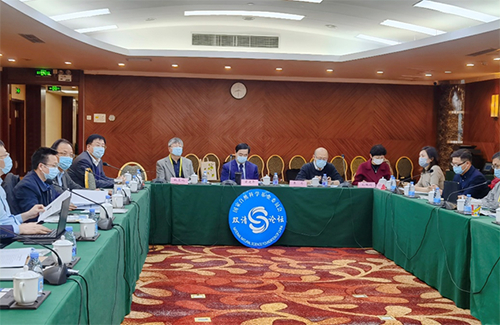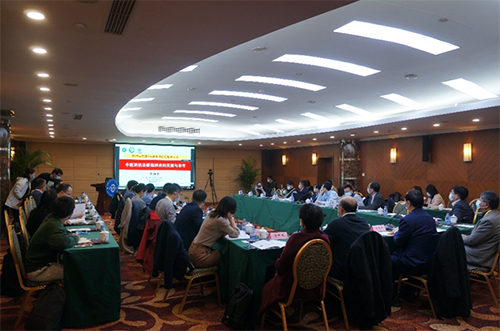

From March 28th to 30th, 2022, the 304th Shuangqing Forum of the National Natural Science Foundation of China (hereinafter referred to as the Natural Science Foundation of China) 'Monitoring and Early Warning of Virus and Microbial Transmission in the Atmosphere' was held in Beijing. The forum was jointly sponsored by the Department of Earth Science, the Department of Medical Sciences, and the Bureau of Planning and Policy of the Natural Science Foundation of China. The executive chairman of the forum was jointly held by Academician Huang Jianping of Lanzhou University, Academician Zhu Tong of Peking University and Professor Yang Zifeng of Guangzhou Medical University. Academician Zhong Nanshan and Academician Zhang Boli participated in the forum online and gave keynote reports with Academician Huang Jianping respectively. Academician Zhu Yongguan and Academician Xie Shucheng were invited to give a conference report online. More than 40 experts and representatives from universities, research institutes, medical and disease control units from atmospheric science, biochemistry, medicine, health, public management and other fields participated in this forum.
At present, there are a large number of new local new coronary pneumonia infections in my country, and the scope of infection is wide. The spread and concealment of virus variants are stronger, exposing the shortcomings of the existing epidemic monitoring and early warning capabilities and levels to detect the spread of the virus as soon as possible. Therefore, the monitoring and early warning of the environmental spread of the virus needs to be further improved, which strongly supports China's general strategy of 'preventing imports from abroad and preventing rebound from within' and the general policy of 'dynamic clearing'. This forum arranged 3 thematic reports, 2 conference reports and 23 special reports focuses on four topics, 'The Influence Mechanism of Climate and Environment on the Transmission of Pathogenic Microorganisms', 'Environmental Monitoring of Pathogenic Microorganisms and Aerosol Transmission', 'Development of Global-regional Coupling Epidemic Transmission Models' and 'Management Theory and Policy of Large-scale Epidemic Outbreaks'. Experts at the meeting conducted in-depth discussions on the topic, sorted out the mechanism of virus and microorganism transmission in the atmosphere, monitoring and early warning, the research basis of epidemic prevention and control management theories and policies, existing achievements and challenges, and condensed the urgent need for attention and solutions.
Experts at the meeting agreed that in the actual fight against the new crown pneumonia epidemic, it is essential to speed up the construction of an infectious disease environmental monitoring and early warning system, develop a multi-scale coupled epidemic early warning system, strengthen its supporting role in epidemic prevention decision-making and medical treatment, and improve China's response to major emergencies.
Yu Sheng, Executive Deputy Director of the Earth Science Department of the Natural Science Foundation of China, Sun Ruijuan, Executive Deputy Director of the Department of Medical Sciences, Yao Yupeng, Fan Yingjie, Deputy Director of the Planning and Policy Bureau, and the relevant staff of the Department of Earth Science, Medical Science, Planning and Policy Bureau, Science Communication and Achievement Transformation participated in the forum.
